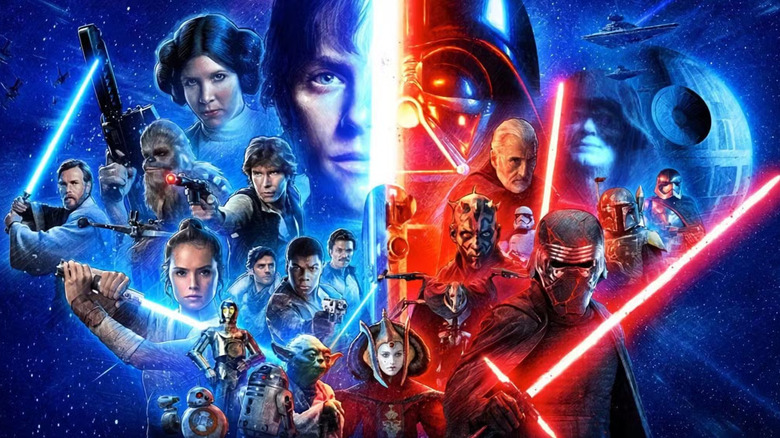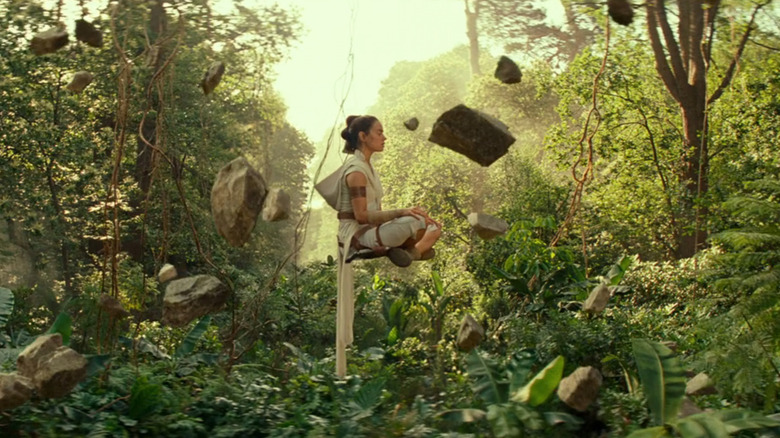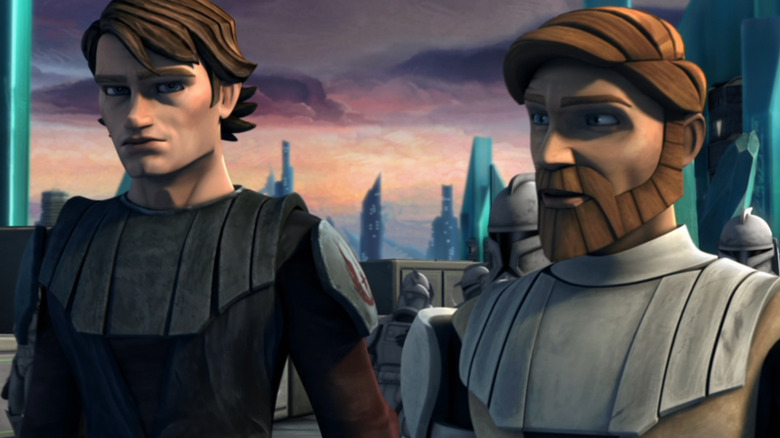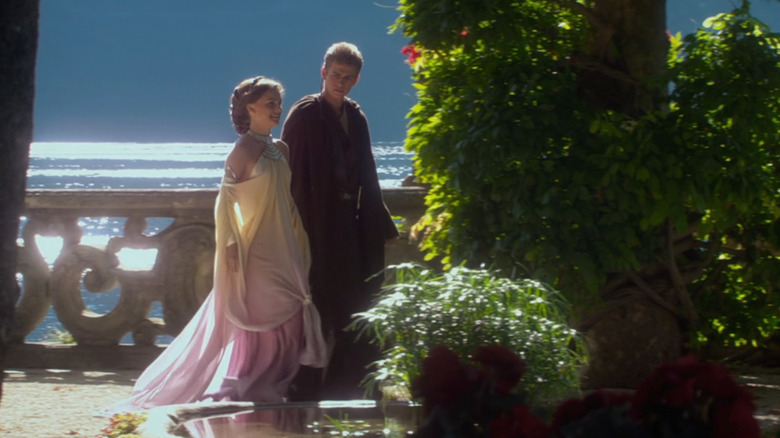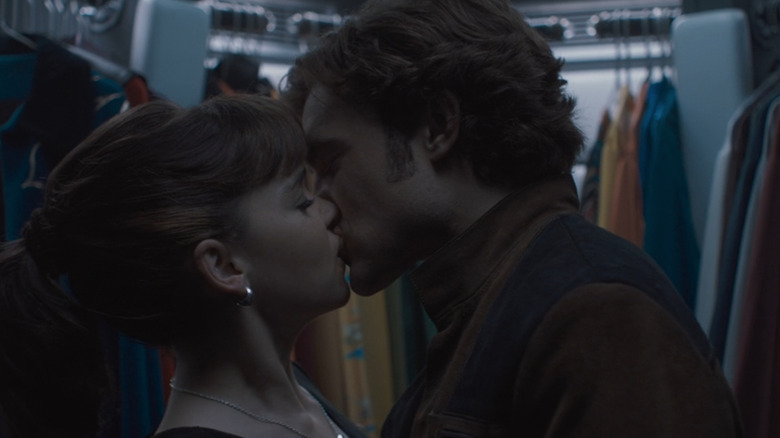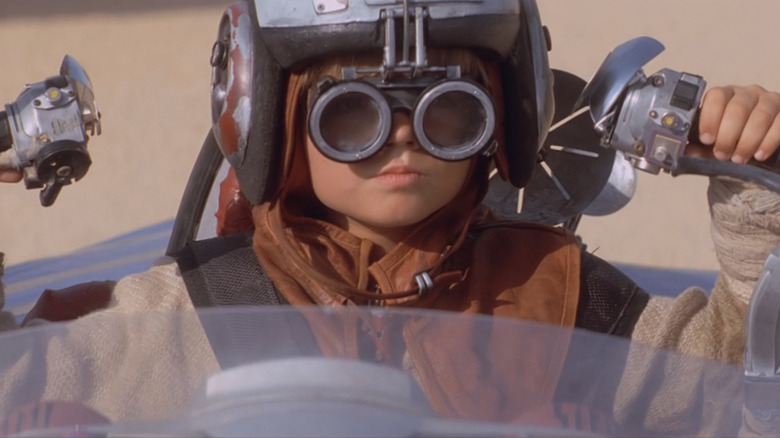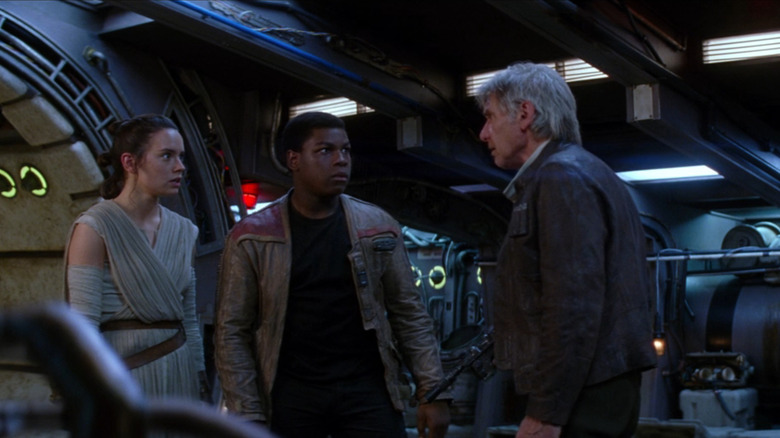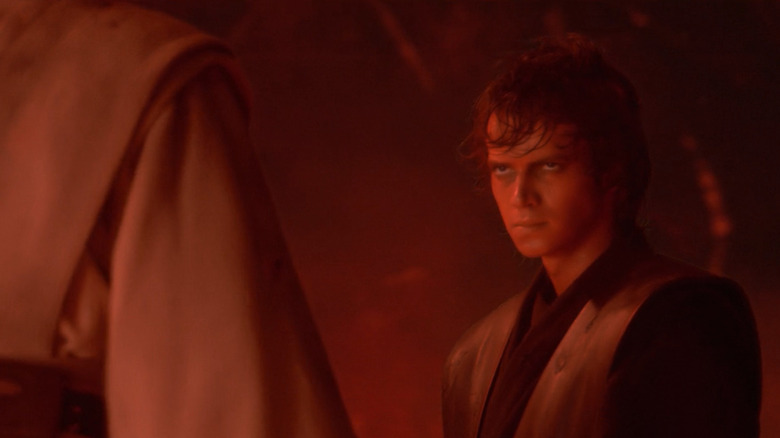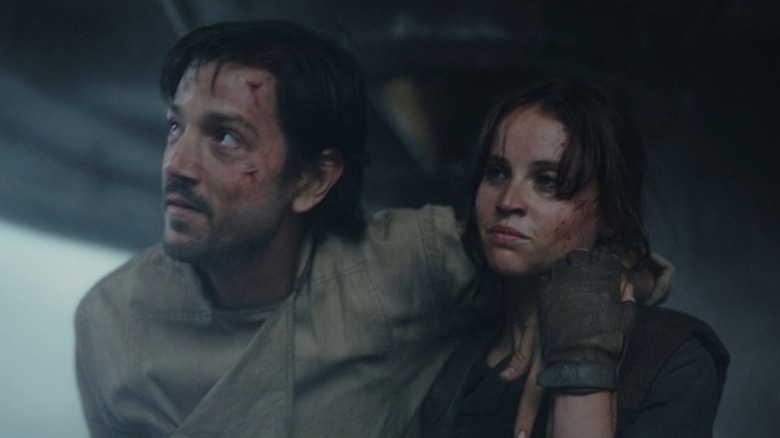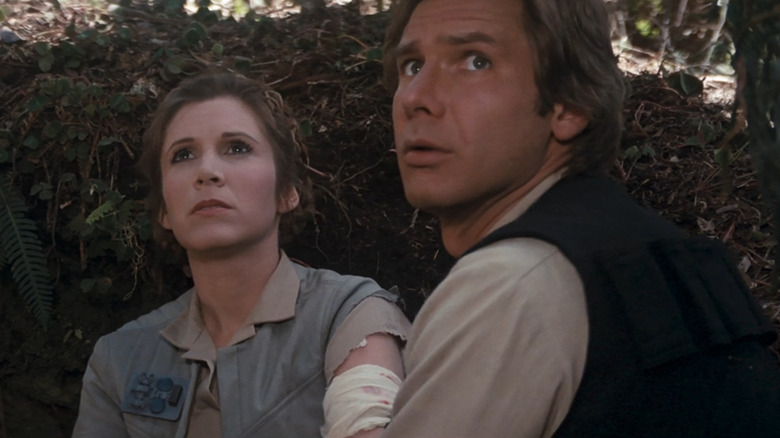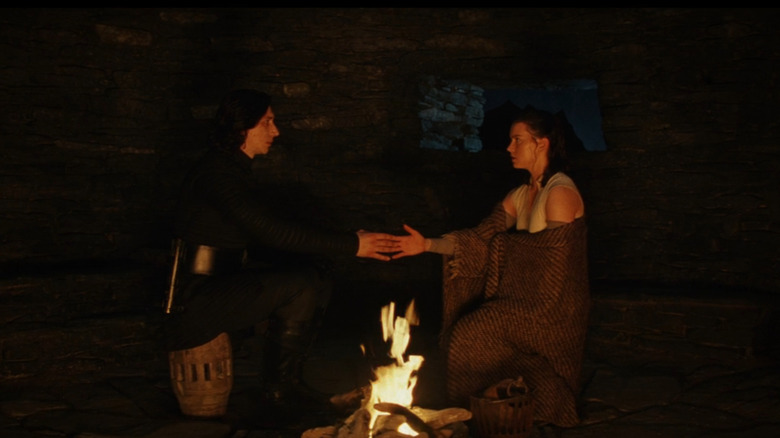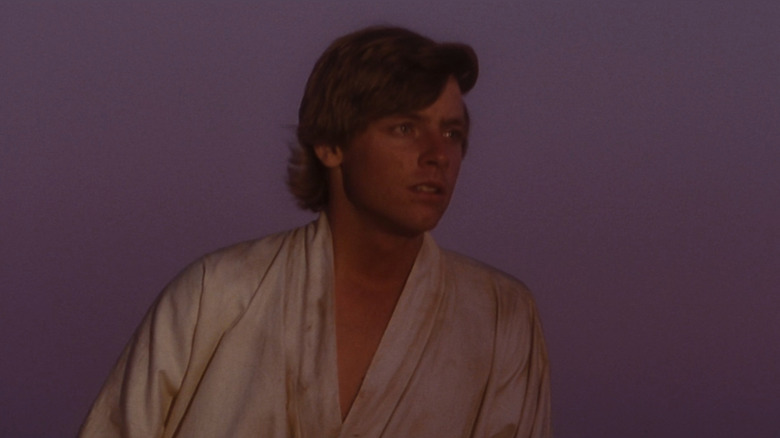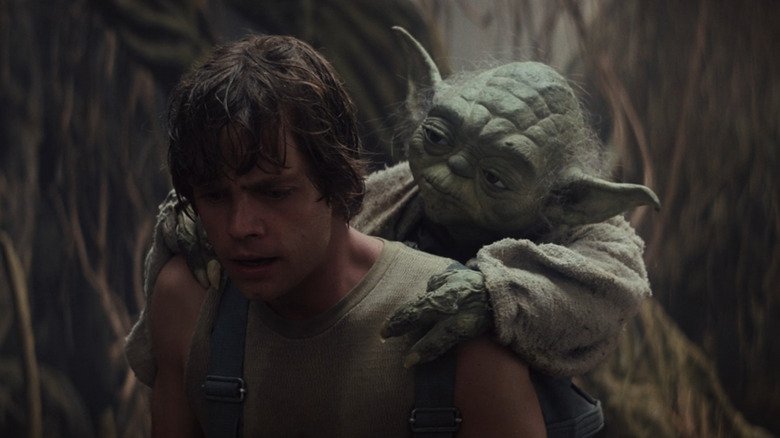All 12 Star Wars Movies, Ranked From Worst To Best
Unless you've been living under a rock for the past 50 years, you most likely have at least a passing familiarity with Luke Skywalker, Princess Leia, Yoda, and Darth Vader. "Star Wars" has been one of the world's most popular franchises since the first film was released back in 1977, and at this point, its most famous moments (including Darth Vader's iconic "I am your father" confession) have spilled out into the public consciousness, known even by people who haven't seen the films. But that doesn't mean that every "Star Wars" movie is of the same quality as its very best outings — far from it.
In fact, every self-respecting "Star Wars" fan seems to have a litany of grievances against their beloved franchise, railing against one film or another for ruining "Star Wars." But since they all seem to blame different films for the sci-fi series' alleged downfall, coming up with a definitive list ranking them from top to bottom is no small task. Nevertheless, we've given it a shot — for better or worse, these are the films of "Star Wars" ranked from worst to best.
12. The Rise of Skywalker
Woof. Where do we even start with "The Rise of Skywalker?" The weary tone with which Oscar Isaac delivers the line, "Somehow, Palpatine returned?" The fact that they decided to throw out the idea that even nobodies can be heroes in favor of giving Rey a legacy heritage? Or maybe the narrative that basically only exists to undo everything set up in the previous film? "The Rise of Skywalker" is a mess from start to finish, and although it has a few exciting moments, it also has well more than its fair share of nonsensical plot lines and missed opportunities.
Overall, it reeks of a laziness — bringing the Emperor back as a villain, having Rey take on the name of Skywalker as though there's only family that's allowed to be of consequence in the entire "Star Wars" universe — that leaves the sequel trilogy on a sour note. Always struggling for an identity of its own, "The Rise of Skywalker" is best described as a hodge podge of different ideas, none of which it ever bothers to explore. And the fact that it has the nerve to deliver not one, but two, fakeout death scenes without having the courage to actually kill off any of its legacy characters makes it cowardly to boot.
11. The Clone Wars
Released in the aftermath of "Attack of the Clones," "The Clone Wars" was the first feature-length animated film to come out of the "Star Wars" universe. Unfortunately, it was met with a largely negative reaction. Set in the midst of "The Clone Wars," which we see beginning to kick off at the tail end of "Attack of the Clones," the Dave Filoni film gives us a glimpse of Anakin (Matt Lanter) and Obi-Wan (James Arnold Taylor) not as just Jedi Knights, but as military commanders. It also introduces the now fan-favorite character of Ahsoka Tano, voiced by Ashley Eckstein.
Although the "Clone Wars" television series that followed is widely acclaimed, this film feels a little bit clumsy, both in its narrative and animation style. As a ersatz pilot episode of the "Clone Wars" show, it's perfectly acceptable, but it falls apart as a standalone film in its own right. We understand that Lucasfilm was trying to draw eyes to the show with a big, splashy theatrical release of "The Clone Wars," but this really should have been relegated to the small screen.
10. Attack of the Clones
Remember when everyone warned Qui-Gon and Obi-Wan that it was probably a bad idea to try to turn Anakin into a Jedi, since he was way too old to fully adopt their ascetic lifestyle and would probably always be an emotional turbine? We see why they were right in "Attack of the Clones," when Anakin — now 19 years old and extremely sulky — is reunited with Padme, and the two fall in love. Cute, right? Well, that's a matter of opinion. Although the romance between Anakin and Padme is painted as an epic love story, George Lucas's writing of their more intimate scenes leaves a lot to be desired, and it ends up feeling cringey and sophomoric rather than eliciting swoons.
Look no further than Anakin's now-famous monologue about how much he hates sand. The passing years have vindicated Hayden Christensen's performance in the lead role, which was much maligned at the time, but the same can't be said for the film in general, which lets down all of its actors. The best that can be said about it is that Italy looks gorgeous as Naboo, and Ewan McGregor seems to be having a great time settling into his role as young Obi-Wan Kenobi, constantly bemused by his young apprentice. Oh, and if any character deserves a spinoff, it's Dex Jettster.
9. Solo
Poor, poor Alden Ehrenreich. He never really had a chance. The shenanigans that saw "Solo" change hands in the middle of production had a major impact on the end result of this misbegotten prequel, making it tonally awkward on top of all its other issues. Even back when Disney was handing out spinoff "Star Wars" films like Oprah, the idea of a prequel film exploring the early days of Han Solo felt unnecessary — especially since the actor they hired to play "young" Han Solo looks just a few years younger than Harrison Ford was in the original film.
Although Alden Ehrenreich nails the devil-may-care charm of Han Solo, this is one character who doesn't really benefit from having his backstory explored in detail. Was anyone really wondering how Han Solo got his last name? Did we need to witness the moment where Han and Chewie first met? This is the kind of thing that fans think they want, but it rarely plays out satisfyingly on screen. "Solo" was a (comparative) box office failure for Disney, leading them to reconsider their approach to "Star Wars" spinoff films in general.
8. The Phantom Menace
Remember when everyone first saw "The Phantom Menace" and made fun of the opening crawl, suggesting that tariffs and trade disputes were hardly the stuff of compelling political drama? We were so innocent back then.
This was the first "Star Wars" film that had come out since "Return of the Jedi" back in 1983, and anticipation ran so high that looking back, it was always going to be impossible for "The Phantom Menace" to live up the hype. And true to form, the Star Wars fans did not respond kindly to it, treating the actors playing young Anakin and Jar Jar Binks (Jake Lloyd and Ahmed Best, respectively) especially cruelly. But with the benefit of hindsight, we can appreciate "The Phantom Menace" for what it does well.
It introduces some spectacularly memorable characters, from Qui-Gon Jinn (Liam Neeson) and Shmi Skywalker (Pernilla August) to Watto and Darth Maul, and the extended podracing sequence alone is worth the price of admission. Sure, it's jarring to see a young Darth Vader yelling "Wizard!" and "Yippee!", but if you look beyond that, there's a lot to like about "The Phantom Menace."
7. The Force Awakens
For those who weren't there, it's hard to describe the fever pitch of excitement among "Star Wars" fans surrounding the sequel trilogy when "The Force Awakens" was first released. We were finally getting a new big screen adventure, complete with a whole new cast of characters, for the first time since 2005. And unlike the prequel trilogy, when we had a general idea of how things were going to turn out, no one knew where the sequels would go. Not even, it turns out, the people making them. "The Force Awakens" won over audiences, largely because it mimicked most of the major plot points of "A New Hope."
But it also succeeds in giving us a new, engaging quartet of characters: Rey, the orphan with the mysterious background and ability to channel the Force; Finn, a rebel stormtrooper; Poe Dameron, the hotshot pilot with a frankly unsafe amount of charisma; and Kylo Ren, the masked villain whose helmet can't hide his considerable daddy issues. It's on the strength of these performances that "The Force Awakens" manages to be more than just a warmed over version of the original "Star Wars" for a new generation.
6. Revenge of the Sith
The operatic conclusion of the prequel trilogy, "Revenge of the Sith" gives us the inevitable fall of Anakin Skywalker to the Dark Side, culminating in his transition to Darth Vader. Although he's an accomplished and lauded Jedi Knight, Anakin is frustrated with what he perceives as a lack of respect from the Jedi Council, grievance that Emperor Palpatine, now on the verge of making a major political move, is eager to exploit. What's striking about this film is that it was unafraid to go to a really dark place, complete with the full-scale murder of Younglings at the Jedi Temple.
But at the same time, it also fully embraces a more intimate melodrama as the relationship between Anakin and Padme comes to its inevitable and tragic conclusion. This is "Star Wars" at its most operatic, for better or worse. And while it has its moments — the lava-filled battle between Anakin and Obi-Wan, for example, pitting the two close friends against each other — it can also be more than a little ridiculous, like when Padme, the woman who was elected to lead an entire planet at the age of 14, dies of a broken heart.
5. Rogue One
"Rogue One" absolutely got a present-day boost from its association with the staggeringly powerful "Andor" — the best "Star Wars" content Disney has put out since they bought the franchise — but it's an impressive film in its own right. Taking place in the days leading up to the events of "A New Hope," "Rogue One" follows the exploits of a group of rebels fighting to deliver the Death Star plans to the Resistance — including the knowledge of a flaw in the design that leaves it spectacularly vulnerable, as Luke Skywalker would demonstrate.
Although there's a sense of inevitability to the entire production — we know that the entire ensemble cast won't survive to see the events of "A New Hope" — "Rogue One" is nonetheless emotionally compelling and full of tension. It's not always easy to get audiences to get emotionally invested in characters they already know are going to die by the end of the film, but "Rogue One" succeeds fully in that regard. This is largely thanks to the likeable cast, led by Felicity Jones and Diego Luna, whose performance spawned the birth of "Andor." For that alone, we owe this (rogue) one a debt of gratitude.
4. Return of the Jedi
The third in the original "Star Wars" trilogy, "Return of the Jedi" is often considered to be an ever-so-slight drop in quality from the first two. Fans grumble about the introduction of the Endor-based community of Ewoks, creatures that look like teddy bears and are viewed by many as a cynical merchandising ploy. But although it's a little sillier than "A New Hope" or "Empire Strikes Back," "Return of the Jedi" is a perfectly serviceable conclusion to the iconic original series.
The Rebellion is faced with yet another roadblock when the Empire decides to build a second Death Star near the forest moon of Endor. At the same time, Luke becomes determined to confront his father, hoping that he can win him back over to the Light Side with a stirring rendition of "Cats in the Cradle." (OK, not really, but he might as well have.) Of course we know now that the "Star Wars" legacy would expand far beyond just these three films, but if it had all ended with "Return of the Jedi" in 1983, that would have been a satisfying ending to a thrilling series.
3. The Last Jedi
Look, not everyone may agree with "The Last Jedi" turning up this high on the list, but for our money, it can go toe-to-toe with the best that "Star Wars" has to offer. Rather than warming up a recycled narrative from an earlier "Star Wars" film, it represents a natural progression of the franchise, with a nuanced, mature take on the characters we all know and love. Perhaps, in the end, that was why so many within the Star Wars fan community maligned "The Last Jedi" as a failure — they weren't interested in seeing their childhood hero Luke Skywalker (Mark Hamill) made bitter and disillusioned by the failures of his career as a Jedi, even if his character arc ultimately shows him returning to form in one of the best fight sequences "Star Wars" has produced.
But beyond that, we see all of the characters learn and grow, a process that takes them in directions that audiences may not necessarily expect. This is shown especially vividly in the relationship between Rey and Kylo, who struggle with the inexplicable connection that binds them together. "The Last Jedi" may have a vocal community of critics, but it's arguably the boldest modern "Star Wars" outing, one that isn't content to coast on nostalgia but actually has something new to say.
2. A New Hope
"A New Hope." The one that started it all. It's a nigh-on perfect space Western, complete with the wistful farm boy dreaming of a bigger world and an evil empire whose long, insidious arms are felt across the entire galaxy. We begin on Tatooine, when our hero Luke Skywalker meets a mysterious hermit, Ben Kenobi (Alec Guinness), and finds a video message from the beautiful Princess Leia (Carrie Fisher) begging for help. Together with the loveable scamp Han Solo and his co-pilot Chewbacca, they launch a rescue mission that takes them to the heart of the evil Empire.
"A New Hope" is an entertaining standalone adventure in its own right, but it holds such a vaunted position within the franchise because of its incredible world-building that made it possible for all the other films to expand upon. We've all taken pot shots at George Lucas from time to time, but he deserves an endless amount of credit for his work here, creating an ensemble of characters who audiences immediately connected with, and utilizing tropes from Westerns and war films to give us a new take on the space film.
1. The Empire Strikes Back
As wonderful as "A New Hope" is, "The Empire Strikes Back" somehow manages to top it, becoming one of the very few sequels that's better than the original film. We leave "A New Hope" on a high note, with triumphant music and the awarding of medals to Han Solo and Luke Skywalker for their part in destroying the Death Star. But "Empire Strikes Back" makes it clear that although they won a key battle, victory over the Empire won't be so easy.
And indeed, our characters are hit with some pretty serious hurdles. Han gets frozen in carbonite. Luke loses a limb and learns that his dad is actually the right-hand man of Emperor Palpatine. Together, they're taking some pretty big Ls. But although they still have a long way to go — to rescue Han, to finish training as a Jedi, to come to terms with their unexpected new ancestral origins — "Empire Strikes Back" still ends with a note of hope. And it's hard not to fall in love with the new characters who are introduced in the film, from Yoda (who has never been better than in his silly Muppet form here) to the rogueish Lando Calrissian (Billy Dee Williams). It simply doesn't get much better than this.
